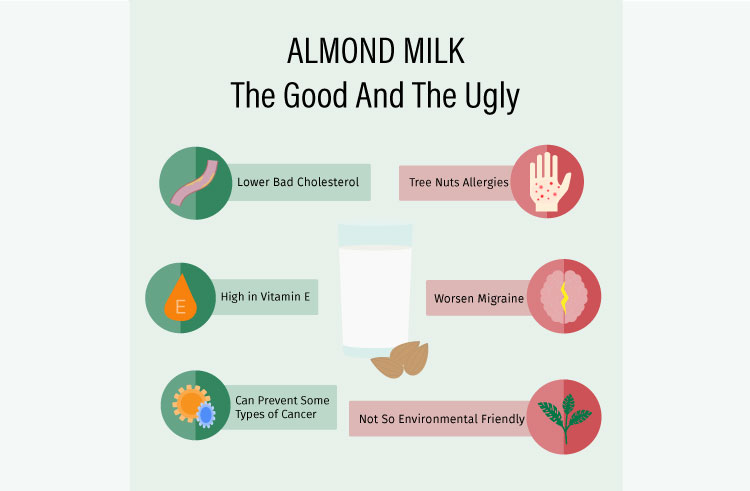Nutrition
Per 100 ml of plain, natural unfortified almond milk
Energy 34 kcal
Fat - 3.1 g.
Proteins - 1.2 g.
Carbohydrate - 0.4 g.
Sugars- 0.2 g.
Fiber - 0.7 g.
Vitamins - Vitamin E 30%
Minerals - Biotin 7%, Copper 6%
Benefits
Lower Bad Cholesterol
Almond milk contains mono-saturated fat helping lower bad cholesterol, naming LDL, and increase the level of good cholesterol (HDL). Studies have shown the effect of almond consumption on cholesterol levels, both bad and good.
High in Vitamin E
Almond milk contains high amount of vitamin E which is proven to maintain healthy cells, repairs damaged skin and balance the hormones. A 100ml of almond milk contains at least 30% of vitamin E. Research also found the intake of vitamin E may improve heart disease, Alzheimer’s and skin cancers.
Can Prevent Some Types of Cancer
Almond is high in antioxidants which helps prevent damage from free radicals the molecules causing cellular dysfunction. Most antioxidants in almond can be found in almond skin, which research suggests to roast the seeds and maintain the skin extracts to receive most of the antioxidant capacity. One study found reduce in oxidative stress biomarkers (overwhelmed free radicals) in smokers when consuming almond by 23-34% by 4 weeks.
Side Effects
Tree Nuts Allergy
Almond is one member of the tree nuts group which include the hard shell nuts such as hazelnut, Brazil nut and macadamia nut. The symptoms can occurs right after consumption to few hours after. The allergic reaction to almonds products are itchy mouth, asthma, swelling throat and other severe physical reaction. If you have these symptoms, stop consuming immediately and check with your doctor.
Worsen Migraine
Almond is source of tyrosine, the non-essential amino acid that usually benefit the brain neurotransmitter and regulating hormones. However, tyrosine is found to increase migraine headache for people who already has the symptoms and cause upset stomach. People with thyroid conditions should also avoid almond milk and almond based products tend to increase thyroid hormones level.
Not So Environmental Friendly
Despite the benefits of almond, Almond production is quite harmful to the planet. 80% of the world’s almond production are cropped in California which the area has been experiencing bad drought. It take takes 5 liters of water to grow 1 almond seed and it takes around 40 - 60 almonds (0.5 cup) to make a cup of almond milk. This might not seem as bad as the production of cow’s milk (1 liters of water to produce 100ml), it’s the fact of the land that has been used excessively.
Final Thoughts
Almond milk has lots of vitamins and antioxidants that can help prevent some types of cancer as well as help lowering bad cholesterol. However, almond milk is not suitable for everyone as it contains substances that trigger allergic reaction and migraine. Another bad sides is that the almond production uses lands in the west part of America excessively which is the problem that shouldn't be overlooked.
I would suggest as many recommendations would say, consume in moderation. It really is not bad at all to consume almond milk if you don't have some health conditions, but more consumption means more lands are damaged. Just don't go crazy on everything almond milk.

